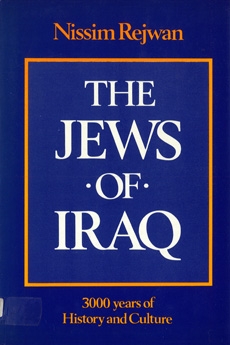|
PREFACE
Apart from the last few chapters, where I made use of my own limited first-hand knowledge and observation, this book makes no claims to original research, its chief merit being the way the information is collated, summarized and organized. For some time now, the need has been felt for a straight, comprehensive and brief account of the Jews of Iraq, their history, culture and society, and in putting this account together I have tried to do something by way of filling that need.
The nearly three millennia of Iraqi Jewish history surveyed here are covered in three parts, dealing respectively with the period extending from the first Assyrian captivity in the early eighth century BC to the Arab conquest in the middle of the seventh century ad; the encounter with Islam (641—1850); and the last hundred years (1850—1951), a period of political upheaval and radical change culminating in the mass exodus of the Jews to Israel. Learning from my experience as a reader, I have also attempted to depict the story of the Jews of Iraq in its wider context of general Jewish and of Iraqi and regional history. My hope has been to spare the reader the difficulty of trying to fit the account into events and developments in the surrounding world.
I am indebted to the many authors and scholars whose own labours have provided the groundwork for this book. My thanks also go to Dr Davide and Mrs Irene Saia (Salman), whose active interest and whose encouragement made the production of this book possible. I have also benefited greatly from the comments and suggestions offered by friends who read the work in manuscript. My thanks to all of them - and to my editor at Weidenfeld and Nicolson, Ms Linda Osband, for her diligence, patience and forbearance.
Nissim Rejwan
Jerusalem, May 1985
Part One
From the Assyrian Captivity to the
Arab Conquest (731 bc-ad 641)
From the Maccabean era to the middle of the eleventh century, when the Babylonian academies fell into oblivion, the development of the Talmud and its elevation to a position of classical authority constitute the most significant achievement of the Jewish people. And this, too, may be added: the intellectual qui vive so characteristic of Jews throughout the Middle Ages despite contumely and persecution was the result of the Talmud.
Judah Goldin'
Chapter I
Roots
For close on four millennia the fortunes of the Jewish people, the growth of their religious beliefs and the shaping of their culture were in one way or other inextricably linked with ‘the land of the twin rivers’, now known as Iraq. At first glance Egypt, the ancient Hebrews’ other close neighbour, would seem to have exercised a more decisive influence, if only because of its geographical proximity to the Land of Israel. However, in the cultural sphere Israel’s contacts with Mesopotamia were far closer than they were with Egypt. Indeed, most of the important outside influences - as reflected in the Bible - came from the direction of Mesopotamia, and much of the contents of the early chapters of Genesis points unmistakably to that land.
The founding Patriarch came from Mesopotamia; he had been bidden to leave that land for the very purpose that is to become the leading theme of the Bible, namely, the quest of an enduring and universally valid way of life. The story of the ages anterior to the period of Abraham should, therefore, bear the distinctive imprint of his original homeland. That it does so in fact is but further proof that the account as a whole is based on genuine traditions instead of being the invention of some imaginative writer, or school of writers.1
It was thanks to this affinity with Mesopotamia, which goes back far into the past, that the people of Israel was able to go on to its unique and enduring achievement by filling the vast spiritual vacuum that had caused Abraham to leave Mesopotamia and proceed to the Promised Land. ‘That the original promise was fulfilled remains to this day one of the great wonders of history. The credit, however, for giving Israel its all-important start, physically and culturally, belongs to ancient Mesopotamia.’2
The ancestors of the present-day Jews were members of a clan of no clear ethnicity or peoplehood led by Terah, father of the Patriarch Abraham. The clan left Ur of the Chaldees in Sumer, spent some time in Harran in upper Mesopotamia, and finally left for Hebron in the …
| 